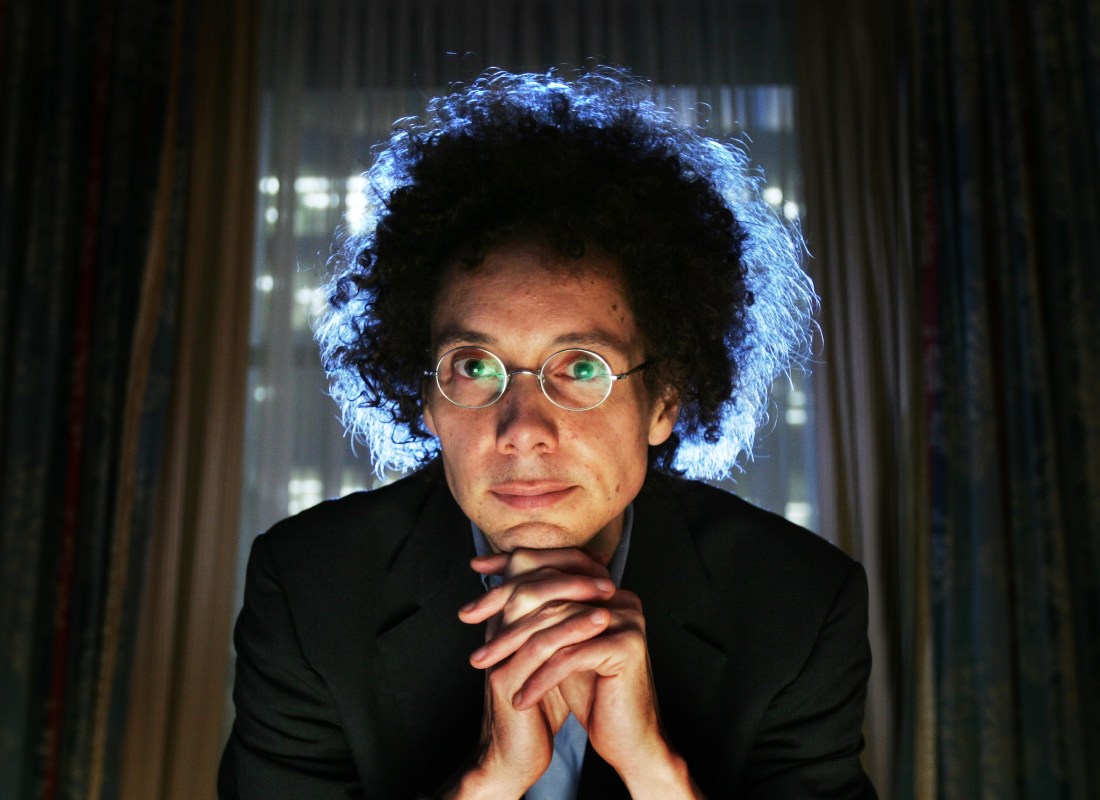The internet is usually annoyed with Malcolm Gladwell.
In 2019, The Atlantic more or less panned the Canadian’s sixth book, Talking to Strangers, and mostly attributed the book’s failures to general fatigue with the Gladwellian method.
The author had been at it a long time. Long before podcasts became ubiquitous and “TikTok thinkers” began earning followers with carefully edited clips, Gladwell traded in pop social science. His theses were scintillating yet simple, and tended to blend takes on historical figures and modern mores, which is usually a surefire way to take over a conversation (e.g., to better understand this issue, let’s talk Hitler then segue into our addiction to iPads).
This has worked for a while. It helped Gladwell sell millions of books and solidified him as a multi-hyphenate, 21st-century philosopher. Since 2016, he’s had his own podcast, of course, called Revisionist History, which is billed as “Gladwell’s journey through the overlooked and the misunderstood.”
Still, many of Gladwell’s active detractors, in addition to more casual onlookers, subscribe to the sort of takes outlined by Atlantic writer Andrew Ferguson when he reviewed Gladwell’s book in 2019. At the time, an exhausted Ferguson wrote:
- “Gladwell often builds his arguments from other peoples’ sketchy statistical manipulations and the far-fetched results he’s managed to cull from social-science journals.”
- “When he encounters a study published in a journal with a complicated name, he defaults to swallowing it whole. At times he approaches self-parody.”
- “Of course, if Malcolm Gladwell had practiced epistemological humility for the past 20 years, he would have sold millions fewer books.”
- “…he acts as a great mystifier, imposing complexity on the everyday stuff of life, elevating minor wrinkles into profound conundrums. This, not coincidentally, is the method of pop social science, on whose rickety findings Gladwell has built his reputation as a public intellectual.”
In summary: Gladwell is a pompous, manipulative pseudo-intellectual who researches his best-selling books by skimming Wikipedia. Is that fair? Probably not. Gladwell’s work ethic is earnest and his curiosity has always felt honest. He’s clearly incredibly well read. But it’s difficult to overcome one’s “Twitter reputation” — and public perception boiled from one of suspicion to outright resentment over the last few days, after the New York Post covered an interview Gladwell sat down for with British podcaster Steven Bartlett, the host of The Diary of a CEO.
Their discussion stretched to 100 minutes, but the Post (and now the rest of the internet, naturally) has zeroed in on Gladwell’s opinion of our new normal, the WFH era. He’s not a fan. As Gladwell said, “It’s not in your best interest to work at home. I know it’s a hassle to come into the office, but if you’re just sitting in your pajamas in your bedroom, is that the work life you want to live?”
He continued, “I’m really getting very frustrated with the inability of people in positions of leadership to explain this effectively to their employees…If it’s just a paycheck, then it’s like what have you reduced your life to?” At one point, Gladwell even gets emotional and wipes tears from his eyes. “If we don’t feel like we’re part of something important, what’s the point? It’s very hard to feel necessary when you’re physically disconnected…It’s really hard to explain this core psychological truth, which is we want you to have a feeling of belonging and to feel necessary.”
The Post knew exactly what it was doing when it posted its headline to Twitter (“Malcolm Gladwell slams working from home: ‘What have you reduced your life to?’”) and the takes have been all over the map. A few highlights:
Okay, we get it. People are mad — mad because they’ve been mad at Malcolm Gladwell for a long time, but especially mad because he’s weighing in on a raw, ongoing issue. The WFH era is under threat for the very first time this summer, as CEOs have changed their tone and pursued methods of finally returning employees to the office. Their labor-facing logic has been the impending recession, which is expected to arrive sometime in the first quarter of 2023, but industry experts claim executives have been annoyed with remote work for well over a year. And then Gladwell arrives, seemingly acting as a voice of reason for the cold-hearted capitalists.
Karen Attiah, a recurring columnist for The Washington Post, tweeted: “Our hyper-capitalistic society depends on us tying our identities to our jobs. What scares the ruling class is that workplace flexibility gives us the ability to reconnect our well-being to our communities, our families, to nature, and to ourselves.”
She isn’t wrong. WFH has been an absolute revelation for those lucky enough to make use of it. In this publication, we’ve charted the rise of midday workouts, opportunities for beleaguered employees to take power naps in the middle of the day (or simply sleep in more, thanks to the eliminated commute) and the ways in which remote work has strengthened family ties and diluted outdated spousal responsibilities. The WFH era has turned “summer Fridays” perennial for some employees, while encouraging more hours outside, more weekends away and more time spent doing things we love with the people we love. Right?
Yes, sort of, sometimes, but it’s just not that simple. Focusing on jobs that hinge on a laptop — because that’s what Gladwell, Attiah and the rest of Twitter are talking about — it’s clear that the WFH wonderland is not a reality for every single employee. As anxiety and depression figures continue to rise, some have wondered what we may have lost when we turned our backs on the office for good. Research fellows at work institutes are concerned about a downswing in “relatedness,” a term they define as “the need to feel connected or have a sense of belonging or connection to other people.”
Urban loneliness has been studied for decades. Long before the pandemic pandemic arrived, it had been called a “virtual pandemic” and compared to smoking fifteen cigarettes a day. Too much time alone basically ups one’s risk of developing heart disease, anxiety, depression and dementia. Dangerous stuff, all, and while the workplace is no herald of happiness in itself, it at least involves regular interaction with other human beings, and — crucially — a cocktail of motivation and purpose. A sense of meaning. Every longevity-rich community on the planet has a special predilection for interaction and purpose; is it really possible to bottle a similar impact while sitting on the sofa in one’s apartment?
It really depends on how one chooses to approach WFH. Gladwell has a point that belonging is essential for health, and pajama days will probably have an adverse effect. Where his argument loses the thread, though, is in assuming the very worst instincts of human beings. Gladwell imagines that every WFH day is the equivalent of an old-school sick day, with a bit of Excel and emails peppered in here and there. But he’s ignoring the nature of his very own WFH days, which he gleefully outlined to The Guardian way back in 2005. Check out this excerpt:
“Malcolm says: ‘I hate desks. Desks are now banished.’ He starts the day writing at home, but this is always done from his sofa, using his laptop. ‘I work better when I’m comfortable,’ he says. After a stint on the sofa, it’s out into the world. I refer to my writing as ‘rotating.’ I always say ‘I’m going to rotate’ because I have a series of spots that I rotate.’ There’s one in the lower East Side. [sic] ‘The waiters are all Australian and they play The Smiths all day long which I find so fabulous. I always go there on the weekends. Then there are restaurants in Little Italy that I go to. I often go to these places in the middle of the afternoon, when they’ll let me linger.’ In his acknowledgements in Blink, Malcolm thanks the staff of Savoy in SoHo. ‘I go there so often. I wrote a big chunk of my book there. They have these huge windows and they open them out so that people on the street are walking right by you. You feel the traffic; you feel in the middle of things and paradoxically I find it very calming.’”
It’s possible Gladwell doesn’t remember this period of his life, or that going to moody cafes on a rotational basis doesn’t square with his perception of the modern WFH era. But what he’s describing pretty clearly depicts a worker finding a sense of daily belonging outside of a traditional work setting. Who’s to say that a worker couldn’t (or shouldn’t) recreate these afternoons 17 years later — or further up the social stakes by participating in a running club or calling a friend in the middle of the day (at a time they might normally be pretending to read spreadsheets in a beige cubicle)?
Ultimately, Gladwell is right that WFH is a slippery slope. Attiah and others are right that WFH is an unprecedented gift. The answer is not to defend one position to the death on social media. (We should note, by the way, that many of the Twitter personalities who believe Gladwell to be a self-promoting shill wrote their one-sided takedowns of a man they’d never met, accrued likes and then immediately tried to acquire followers or sell products in their mentions). It’s to look for ways to optimize that system, to the extent your employment allows, within your own life.
For instance, if your employer is rolling out a hybrid work model, take it. It’s still early days, but researchers seem convinced that two to two-and-a-half days at home a week creates a “magic ratio,” where you can avoid the anxiety and loneliness of working a few feet from where you just slept for seven hours. Moderation is a boring answer, as ever, but it’s the gold standard of every healthy, sustainable regimen, whether you’re working or working out. A system that allows you to consistently take some reps in the office, with your coworkers (which, by the way, is critical to advancing your career — studies indicate permanent WFH employees do get passed on for promotion opportunities), but still stay home and take your foot off the pedal a couple days a week is key. That way, each setting remains relatively fresh.
Twitter slaughtered the messenger on this one. That’s a shame. Gladwell doesn’t have all the answers, but 20 years of writing and speaking have shown that he does have some of them. And surprise, surprise: In an age where open-mindedness is increasingly a rare commodity, those who actually listened to the man — instead of blindly casting stones — are likely a bit better off for it.
Whether you’re looking to get into shape, or just get out of a funk, The Charge has got you covered. Sign up for our new wellness newsletter today.

















